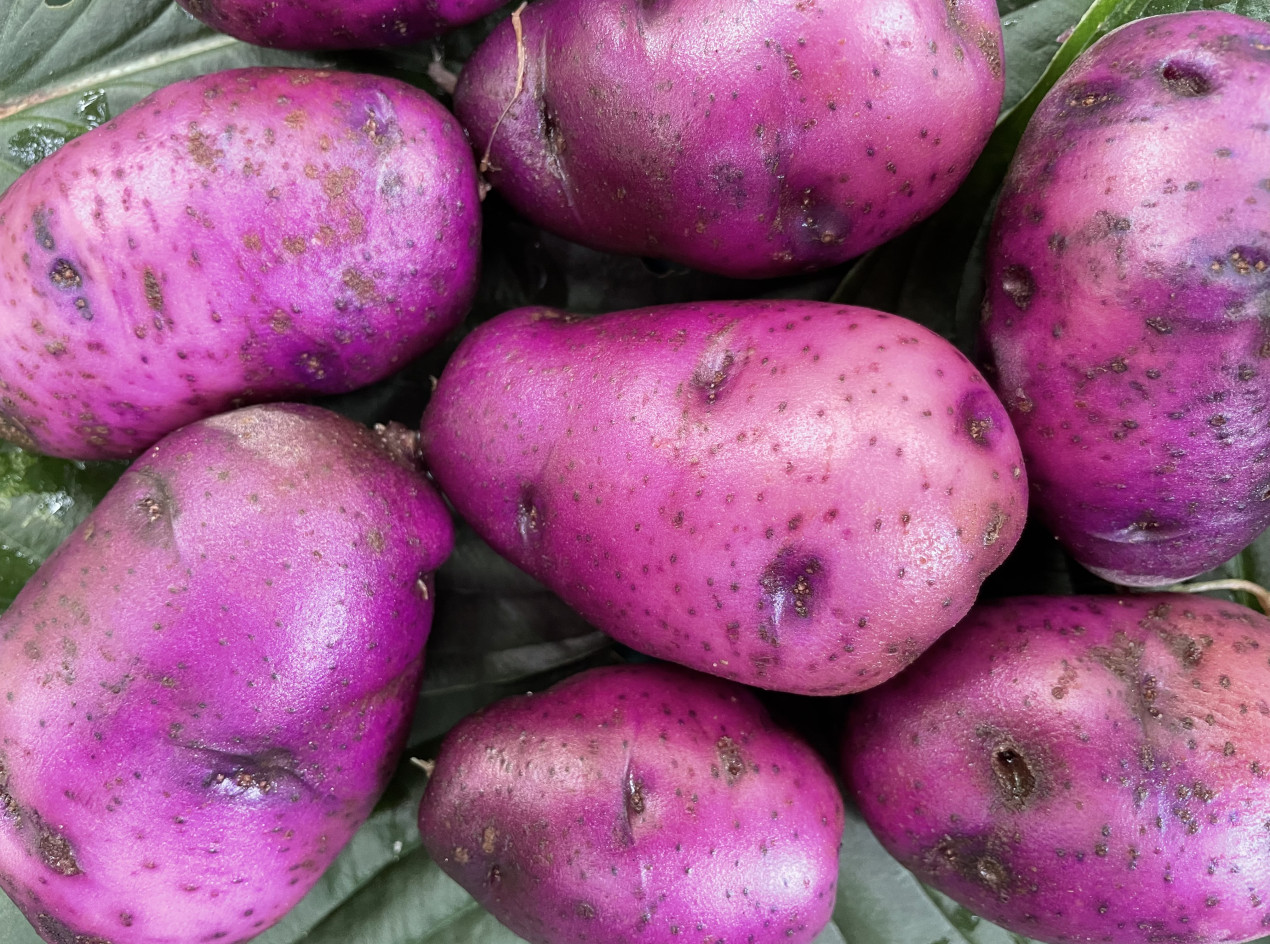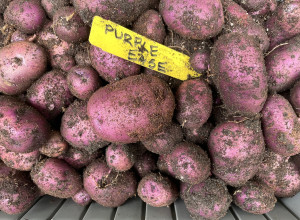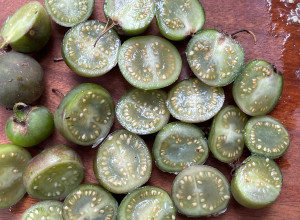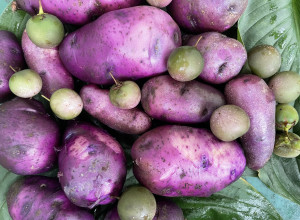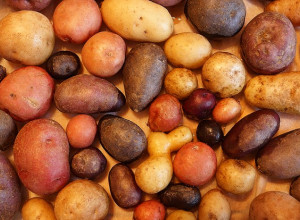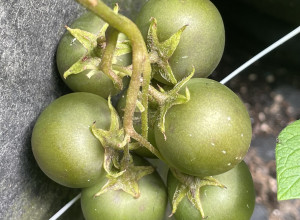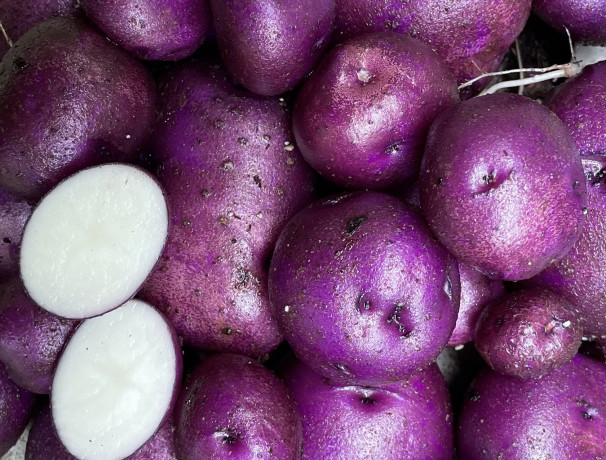Experience-Seeds-Knowledge-Plant Discoveries-Ecological Enrichment-Join Now Click Here!


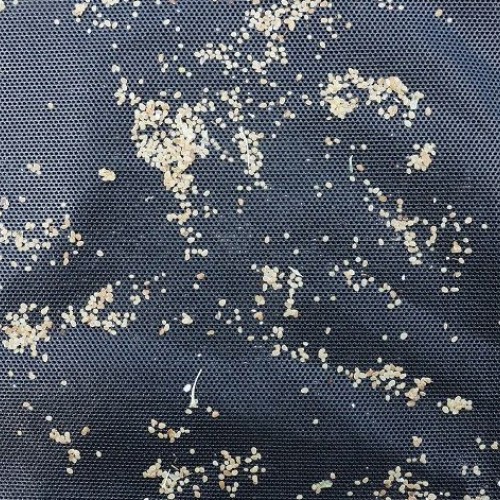
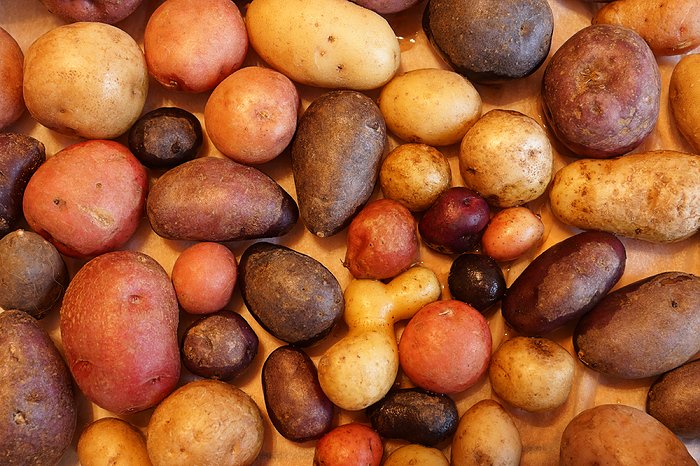
Selected for hardiness in the ground as well as fruitfulness for true seed production of Perennial Perpetual Diversity makes it possible to generate your own varieties as well maintain a population as a low input crop and a wild selection of potato competitive with other plants in non cultivated areas. There are several options to do this both from a named varietal selection as well as from a diversity standpoint using many types of seedlings to allow for breaking the bond of blight and varietal susceptibility to disease.
'Purple Ease' has produced both high yields of tubers as well as full sets of berries to extract seeds from. As a result you will be able to continue this line of fruitful potato without ever having to purchase seed potatoes again. These selections can be used to produce an even greater diversity of potatoes from what is called true seed or diploid potatoes. These are the same selections that overwintered here in southwestern Michigan for the last decade at my farm in southwestern Michigan. Purple Ease as a cultivar is early ripening while being free of blights and virus that normally reduces yields or makes it impossible to continue a line of potato without a tissue culture lab. It overwinters well here and continues to fruit and set berries every year making thousands of seedling potatoes.
Perennial Perpetual Diversity Potato: Selected over the course of a decade of growing potatoes from true seeds, I found by accident that the heirloom blue potato I was growing had set seeds. From there I did a grow out of this seedling line which was planted outdoors unattended to for 5 years. This live and let go philosophy was accidental as I had to take a break from my farm at the time to help a family member with health problems. I did not have the time to harvest them during this time which went on for several years. I soon forgot about them too! From there I began another grow out patch from those seedlings to produce fruits and seeds from. Over time various diseases wiped out many plants quickly and winnowed out the best plants. The remainder of the original patch has now been spread throughout my farm under various conditions as well as growing them cultivated as one year tubers. These are all selections left outside for many years and continue to grow and produce good yields despite the marginal conditions and competition from other plants near their plantings. Some are diploid and some are not. But either way, it is their persistence untended that make them ideal as a perennial tuber crop similar to Jerusalem artichokes. All colors are available when you buy the tubers. The tubers are usually small from 1/2 inch to 1 inch in size.
The true seed philosophy of the potato can allow you to skip the 'viral overload' and start afresh with a new populations. From here you can find your own population adapted to your location as well. That is the purpose of the Perennial Perpetual Diversity potato. You can create a wild self replicating plant if it remains healthy over time as well as setting fertile fruits and seeds. Since the potato has historically been male infertile now comes a time to change that by having wild potatoes free of the plant breeders who created them in the first place. Welcome Perennial Perpetual Diversity! This of course will allow you to develop your own varieties that can be clonally produced too. That is the nature of the potato and the humans that carry them across several continents over the last few thousand years. Using the small tubers generated the first year will then allow you to further grow out the potatoes the way they are traditionally done.
To germinate: Lightly sprinkle seeds on top of the soil or media mix and lightly spray the surface of the soil. Seeds will sprout within one week and continue up to three weeks. If possible for maximum yield start plants one month prior to frost before transplanting outside. Can be direct seeded but needs a fine sandy soil for best results. Treat the seeds like tomato seeds and plant out after frost. Once established try leaving out a portion of the crop to test its winter hardiness. Winter hardy potatoes for me are ones that tend to dry down a little and can freeze without turning to mush. You can also test this by putting them in the freezer. That method works good but it is not as reliable as the outside. Keep your eyes open on fruitful potatoes and keep the seeds of those as well as the potatoes themselves to continue.
True Seeds and tubers are cold stored. Potato tubers are shipped immediately except during the dead of winter. I avoid shipping tubers during ultra freezing weather and take the packages directly to the post office. Early March shipping is the latest that they can be shipped.
How to Germinate the seeds: True potato seeds are very small. Lightly sprinkle over a moist media mix or fine soil and tamp in. Keep moist for around two weeks. The tiny sprouts will show up slowly and begin to spread outwards after a month or so. It may be necessary to thin if you are doing it in grow bags. I would recommend splitting up the planting much like a plug and move those out to the field or another grow bag. Usually it is a very high germination rate. A portion of the crop can be overwintered outside to test for hardiness in the soil as well as disease resistance.
| Plant Specs | |
| Genus & Species | Solanum tuberosum |
| Seed Source | Michigan |
| Hardiness | Tubers can withstand overwintering in the soil even if the soil freezes. |
| Pollination Requirements | Produces berries which seeds can be extracted to produce new plants. Purple Ease always produces a solid crop of berries and is the most self fertile potato on my farm. Self fertile. Seedlings may produce some plants not diploid and will not produce seeds but Purple Ease always produces fertile seeds. |
| Climate | Zones 4-9 |
| Ease of Cultivation | Easy to establish and is a step towards a feral self breeding population as well. This allows for a fresh generation of seed potatoes genetically diverse and free of virus issues. Slow to establish at first. Eventually plants grow fast in this method. |
Related Plants
Tranquility Potato
Selected seedling from an heirloom blue potato known for high yields and great flavor.This sel..
$90.00
